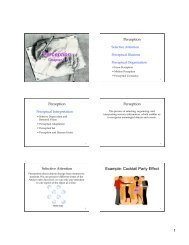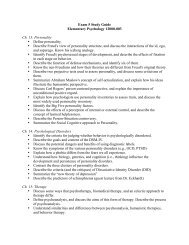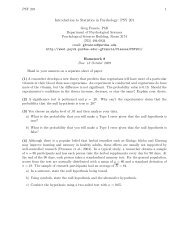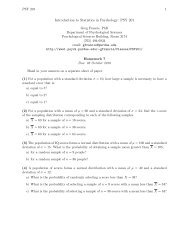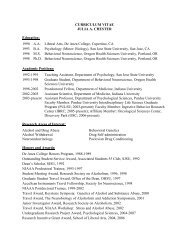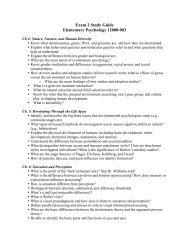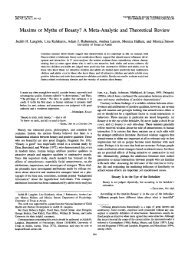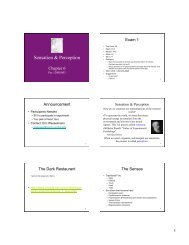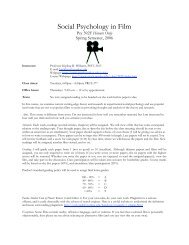Introduction to Cognitive Psychology - Department of Psychological ...
Introduction to Cognitive Psychology - Department of Psychological ...
Introduction to Cognitive Psychology - Department of Psychological ...
You also want an ePaper? Increase the reach of your titles
YUMPU automatically turns print PDFs into web optimized ePapers that Google loves.
Greg Francis 1/7/11Notice!! Subjects hardly ever select the Comet or theClarion!!you might think they do not enter the decisionmaking process at all!!!but they do!! The comparison <strong>of</strong> Asteroid and Comet clearlyfavors the Asteroid!!it is less clear for the Bravo and Comet!!it is the reverse for ClarionPurdue UniversityConsumer beware!! S<strong>to</strong>res are very aware <strong>of</strong> this type <strong>of</strong>behavior!! Thus, they <strong>of</strong>ten s<strong>to</strong>ck merchandise for thesole purpose <strong>of</strong> influencing your purchasingbehavior!!usually <strong>to</strong>wards a more expensive model!! Likewise companies make low-end modelssimply <strong>to</strong> bias you <strong>to</strong>ward higher endmodels and against the competitionPurdue UniversityLoss aversion!! Another general property <strong>of</strong> decision making is thatpeople tend <strong>to</strong> be more sensitive <strong>to</strong> losses than <strong>to</strong>gains!! thus people rarely take an “even-bet”!! the loss <strong>of</strong> $10 is more significant than the gain <strong>of</strong> $10!! This is also why fans <strong>of</strong> sports teams think thereferees treat their team unfairly!! In a game <strong>of</strong> basketball, each team will!! have fouls called on them when they shouldn’t have (a loss)!! Commit fouls that are not called (a gain)!! But the gains don’t count as much as the losses!! So in a truly fair game both teams (and their fans) feel as ifthey were treated unfairly!! <strong>of</strong> course one team wins, so it feels that it overcame theinjusticePurdue UniversityLoss aversion!! The same phenomenon ruins many marriages/relationships!! When your partner does something for you (a gain) itdoesn’t count as much as when your partner doessomething against you (a loss)!! Thus, you perceive your relationship as overall not beingworth the trouble (even if your partner is good as <strong>of</strong>ten asbad)!! That’s why therapists suggest that in successfulrelationships people must learn <strong>to</strong> forgivePurdue UniversityLoss aversion!! By definition a choice is a loss or a gaindepending on where you start!! As a result, loss aversion dramatically affectsmany types <strong>of</strong> choices by magnifying thosecharacteristics <strong>of</strong> a choice that leads <strong>to</strong> aperceived loss!! Consider choosing a jobPurdue UniversityChoosing a job: 1!! You have decided <strong>to</strong> leave your current job. It islocated so far away from your apartment that itrequires an 80-minute commute each way. But you dolike the fact that your job involves much pleasantsocial interaction with your coworkers. Your search fora new job has given you two options and now youmust choose between them. Which job would youprefer?!! Job A: Limited contact with others, commuting time 20minutes.!! Job B: Moderately sociable, commuting time 60 67%minutes.Purdue UniversityPSY200 <strong>Cognitive</strong> <strong>Psychology</strong> 4



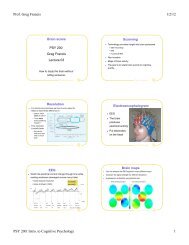

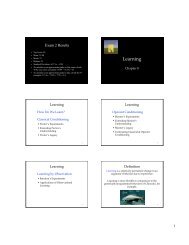
![Exam 4 Study Guide[1]](https://img.yumpu.com/45196739/1/190x245/exam-4-study-guide1.jpg?quality=85)
